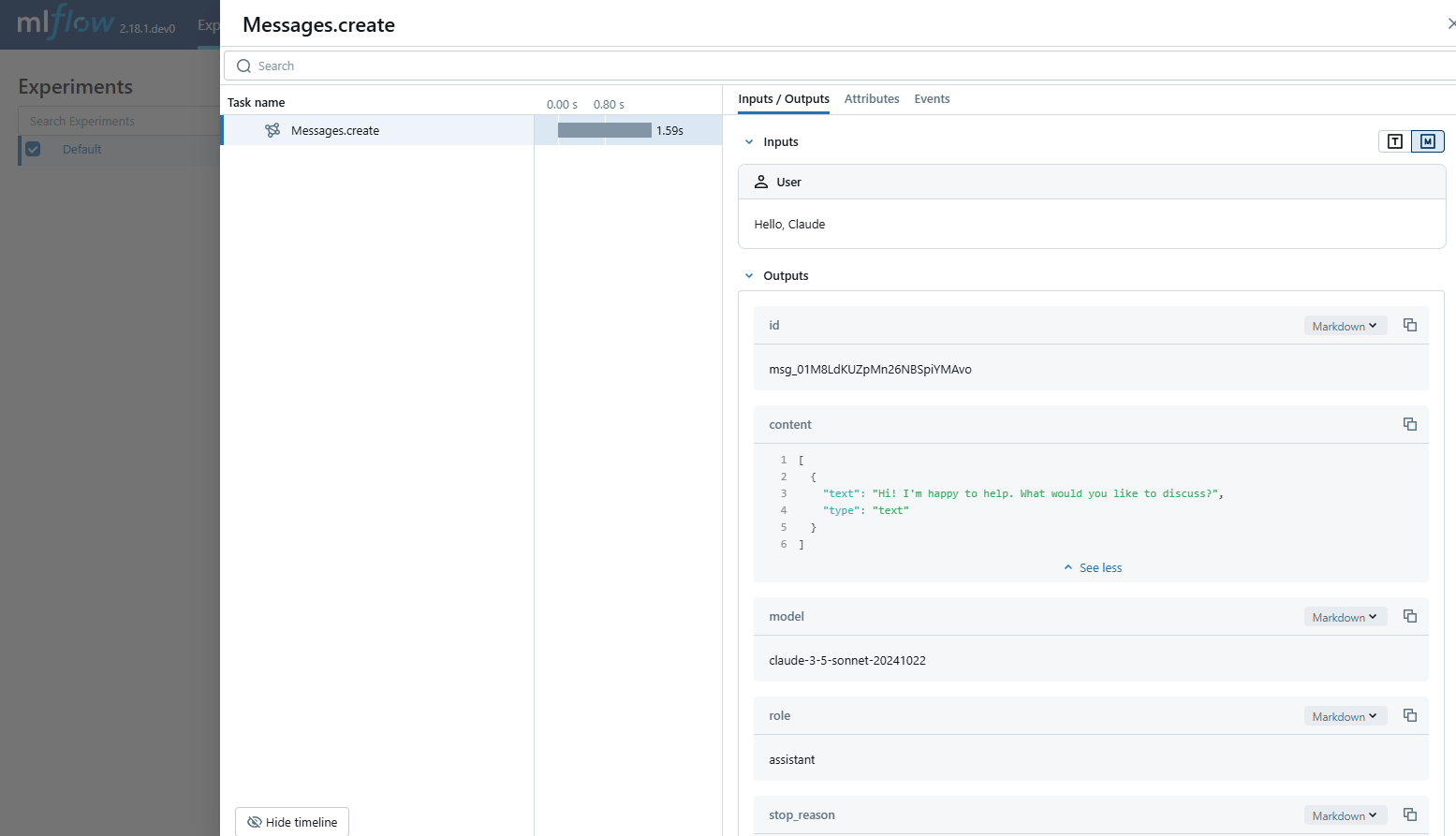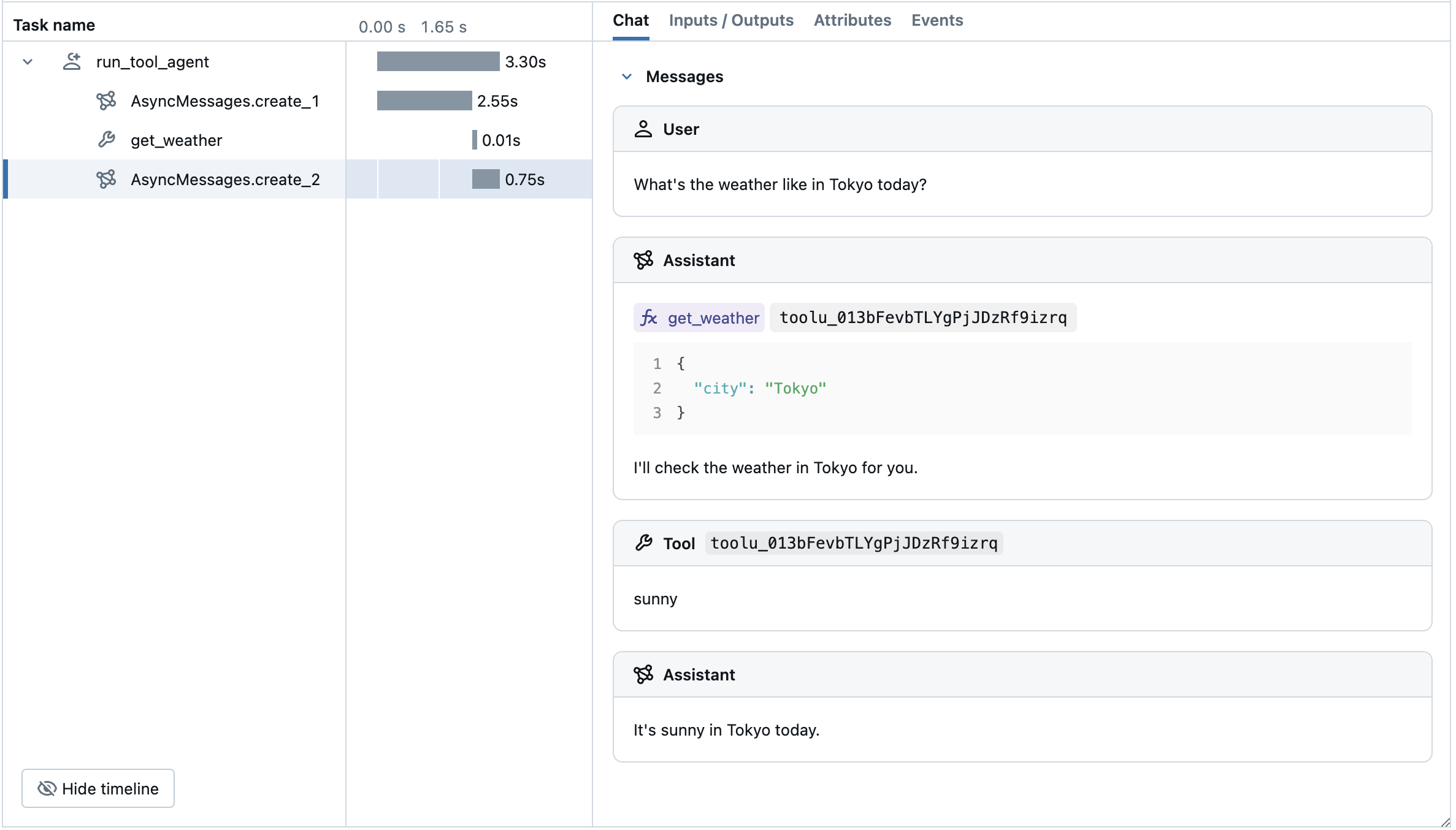Nota:
El acceso a esta página requiere autorización. Puede intentar iniciar sesión o cambiar directorios.
El acceso a esta página requiere autorización. Puede intentar cambiar los directorios.

MLflow 跟踪为 Anthropic LLM 提供自动跟踪功能。 通过调用 mlflow.anthropic.autolog 函数为 Anthropic 启用自动跟踪,MLflow 将捕获嵌套跟踪,并在调用 Anthropic Python SDK 时将其记录在活跃的 MLflow 实验中。
import mlflow
mlflow.anthropic.autolog()
MLflow 跟踪会自动捕获有关 Anthropic 调用的以下信息:
- 提示和完成响应
- 潜伏期
- 模型名称
- 其他元数据(例如
temperature,max_tokens如果指定)。 - 在响应中返回时进行函数调用
- 引发的任何异常
注释
在无服务器计算群集上,不会自动启用自动记录。 必须显式调用 mlflow.anthropic.autolog() 才能为此集成启用自动跟踪。
注释
目前,MLflow 人类集成仅支持对文本交互的同步调用进行跟踪。 异步API不会进行跟踪,并且无法记录多模态输入的完整信息。
先决条件
若要将 MLflow 跟踪与人类学配合使用,需要安装 MLflow 和 Anthropic SDK。
开发
对于开发环境,请安装包含 Databricks 附加程序和 anthropic 的完整 MLflow 软件包:
pip install --upgrade "mlflow[databricks]>=3.1" anthropic
完整 mlflow[databricks] 包包括用于 Databricks 的本地开发和试验的所有功能。
生产
对于生产部署,请安装 mlflow-tracing 和 anthropic:
pip install --upgrade mlflow-tracing anthropic
包 mlflow-tracing 已针对生产用途进行优化。
注释
强烈推荐使用 MLflow 3,以获得与 Anthropic 最佳追踪体验。
在运行以下示例之前,需要配置环境:
对于不使用 Databricks 笔记本的用户:设置 Databricks 环境变量:
export DATABRICKS_HOST="https://your-workspace.cloud.databricks.com"
export DATABRICKS_TOKEN="your-personal-access-token"
对于 Databricks 笔记本中的用户:这些凭据会自动为您设置。
API 密钥:确保配置人类 API 密钥。 对于生产用途,我们建议使用 Mosaic AI 网关或 Databricks 密钥,而不是环境变量:
export ANTHROPIC_API_KEY="your-anthropic-api-key"
受支持的 API
MLflow 支持以下人类 API 的自动跟踪:
| 聊天补全 | 函数调用 | 流媒体 | 异步 | 图像 | Batch |
|---|---|---|---|---|---|
| ✅ | ✅ | ✅ (*1) |
(*1)MLflow 2.21.0 中添加了异步支持。
若要请求对其他 API 的支持,请在 GitHub 上打开 功能请求 。
基本示例
import anthropic
import mlflow
import os
# Ensure your ANTHROPIC_API_KEY is set in your environment
# os.environ["ANTHROPIC_API_KEY"] = "your-anthropic-api-key" # Uncomment and set if not globally configured
# Enable auto-tracing for Anthropic
mlflow.anthropic.autolog()
# Set up MLflow tracking to Databricks
mlflow.set_tracking_uri("databricks")
mlflow.set_experiment("/Shared/anthropic-tracing-demo")
# Configure your API key.
client = anthropic.Anthropic(api_key=os.environ["ANTHROPIC_API_KEY"])
# Use the create method to create new message.
message = client.messages.create(
model="claude-3-5-sonnet-20241022",
max_tokens=1024,
messages=[
{"role": "user", "content": "Hello, Claude"},
],
)
警告
对于生产环境,请始终使用 马赛克 AI Gateway 或 Databricks 密钥 ,而不要使用硬编码的值或环境变量。
异步
import anthropic
import mlflow
import os
# Ensure your ANTHROPIC_API_KEY is set in your environment
# os.environ["ANTHROPIC_API_KEY"] = "your-anthropic-api-key" # Uncomment and set if not globally configured
# Enable trace logging
mlflow.anthropic.autolog()
# Set up MLflow tracking to Databricks if not already configured
# mlflow.set_tracking_uri("databricks")
# mlflow.set_experiment("/Shared/anthropic-async-demo")
client = anthropic.AsyncAnthropic()
response = await client.messages.create(
model="claude-3-5-sonnet-20241022",
max_tokens=1024,
messages=[
{"role": "user", "content": "Hello, Claude"},
],
)
高级示例:工具呼叫代理
MLflow 跟踪自动从 Anthropic 模型中捕获工具调用响应。 响应中的函数指令将在跟踪 UI 中突出显示。 此外,可以使用@mlflow.trace修饰器为工具函数添加批注,以便为工具执行创建跨度。

以下示例使用 Anthropic 工具调用和针对 Anthropic 的 MLflow 跟踪实现简单的函数调用代理。 该示例进一步使用异步人类 SDK,以便代理可以在不阻止的情况下处理并发调用。
import json
import anthropic
import mlflow
import asyncio
from mlflow.entities import SpanType
import os
# Ensure your ANTHROPIC_API_KEY is set in your environment
# os.environ["ANTHROPIC_API_KEY"] = "your-anthropic-api-key" # Uncomment and set if not globally configured
# Set up MLflow tracking to Databricks if not already configured
# mlflow.set_tracking_uri("databricks")
# mlflow.set_experiment("/Shared/anthropic-tool-agent-demo")
# Assuming autolog is enabled globally or called earlier
# mlflow.anthropic.autolog()
client = anthropic.AsyncAnthropic()
model_name = "claude-3-5-sonnet-20241022"
# Define the tool function. Decorate it with `@mlflow.trace` to create a span for its execution.
@mlflow.trace(span_type=SpanType.TOOL)
async def get_weather(city: str) -> str:
if city == "Tokyo":
return "sunny"
elif city == "Paris":
return "rainy"
return "unknown"
tools = [
{
"name": "get_weather",
"description": "Returns the weather condition of a given city.",
"input_schema": {
"type": "object",
"properties": {"city": {"type": "string"}},
"required": ["city"],
},
}
]
_tool_functions = {"get_weather": get_weather}
# Define a simple tool calling agent
@mlflow.trace(span_type=SpanType.AGENT)
async def run_tool_agent(question: str):
messages = [{"role": "user", "content": question}]
# Invoke the model with the given question and available tools
ai_msg = await client.messages.create(
model=model_name,
messages=messages,
tools=tools,
max_tokens=2048,
)
messages.append({"role": "assistant", "content": ai_msg.content})
# If the model requests tool call(s), invoke the function with the specified arguments
tool_calls = [c for c in ai_msg.content if c.type == "tool_use"]
for tool_call in tool_calls:
if tool_func := _tool_functions.get(tool_call.name):
tool_result = await tool_func(**tool_call.input)
else:
raise RuntimeError("An invalid tool is returned from the assistant!")
messages.append(
{
"role": "user",
"content": [
{
"type": "tool_result",
"tool_use_id": tool_call.id,
"content": tool_result,
}
],
}
)
# Send the tool results to the model and get a new response
response = await client.messages.create(
model=model_name,
messages=messages,
max_tokens=2048,
)
return response.content[-1].text
# Run the tool calling agent
cities = ["Tokyo", "Paris", "Sydney"]
questions = [f"What's the weather like in {city} today?" for city in cities]
answers = await asyncio.gather(*(run_tool_agent(q) for q in questions))
for city, answer in zip(cities, answers):
print(f"{city}: {answer}")
禁用自动跟踪
可以通过调用 mlflow.anthropic.autolog(disable=True) 或 mlflow.autolog(disable=True) 全局禁用 Anthropic 的自动跟踪。